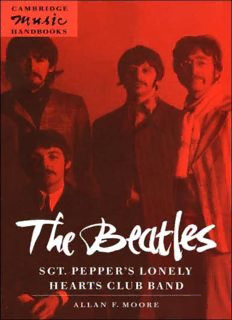
The Beatles: Sgt. Pepper's Lonely Hearts Club Band PDF
Preview The Beatles: Sgt. Pepper's Lonely Hearts Club Band
CAMBRIDGE MUSIC HANDBOOKS The Beatles: Sgt. Pepper's Lonely Hearts Club Band CAMBRIDGE MUSIC HANDBOOKS GENERAL EDITOR Julian Rushton Recent titles Bach: The Brandenburg Concertos MALCOLM BOYD Bartok: Concerto for Orchestra DAVID COOPER Beethoven: Eroica Symphony THOMAS SIPE Beethoven: Pastoral Symphony DAVID WYN JONES Beethoven: The 'Moonlight' and other sonatas, Op. 27 and Op. 31 TIMOTHY JONES Beethoven: Symphony No. 9 NICHOLAS COOK Beethoven: Violin Concerto ROBIN STOWELL Berlioz: Romeo et Juliette JULIAN RUSHTON Brahms: Clarinet Quintet COLIN LAWSON Brahms: A German Requiem MICHAEL MUSGRAVE Brahms: Symphony No. 1 DAVID BRODBECK Britten: War Requiem MERVYN COOKE Bruckner: Symphony No. 8 BENJAMIN M. KORSTVEDT Chopin: The Piano Concertos JOHN RINK Debussy: La mer SIMON TREZISE Dowland: Lachrimae (1604) PETER HOLMAN Dvorak: Cello Concerto JAN SMAZNY Elgar: 'Enigma' Variations JULIAN RUSHTON Gershwin: Rhapsody in Blue DAVID SCHIFF Haydn: The 'Paris' Symphonies BERNARD HARRISON Haydn: String Quartets, Op. 50 W. DEAN SUTCLIFFE Hoist: The Planets RICHARD GREENE Ives: Concord Sonata GEOFFREY BLOCK Liszt: Sonata in B Minor KENNETH HAMILTON Mahler: Das Lied von der Erde STEPHEN E. HEFLING Mahler: Symphony No. 3 PETER FRANKLIN Mendelssohn: The Hebrides and other overtures R. LARRY TODD Messiaen: Quatuorpour la fin du Temps ANTHONY POPLE Monteverdi: Vespers (1610) JOHN WHENHAM Mozart: Clarinet Concerto COLIN LAWSON Mozart: The 'Haydn' Quartets JOHN IRVING Mozart: The 'Jupiter' Symphony ELAINE R. SISMAN Mozart: Piano Concertos Nos. 20 and 21 DAVIS GRAYSON Nielsen: Symphony No. 5 DAVID FANNING Sibelius: Symphony No. 5 JAMES HEPOKOSKI Strauss: Also sprach Zarathustra JOHN WILLIAMSON The Beatles: Sgt. Pepper's Lonely Hearts Club Band ALLAN MOORE Tippett: A Child of our Time KENNETH GLOAG Verdi: Requiem DAVID ROSEN Vivaldi: The Four Seasons and other concertos, Op. 8 PAUL EVERETT The Beatles: Sgt. Pepper's Lonely Hearts Club Band Allan F. Moore London College of Music and Media at Thames Valley University CAMBRIDGE UNIVERSITY PRESS CAMBRIDGE UNIVERSITY PRESS Cambridge, New York, Melbourne, Madrid, Cape Town, Singapore, Sao Paulo Cambridge University Press The Edinburgh Building, Cambridge CB2 8RU, UK Published in the United States of America by Cambridge University Press, New York www. Cambridge. org Information on this title: www.cambridge.org/9780521573818 © Cambridge University Press 1997 This publication is in copyright. Subject to statutory exception and to the provisions of relevant collective licensing agreements, no reproduction of any part may take place without the written permission of Cambridge University Press. First published 1997 Reprinted 1998 (twice), 1999, 2001, 2003, 2004 A catalogue record for this publication is available from the British Library Library of Congress Cataloguing in Publication data Moore, Allan F. The Beatles, Sgt. Pepper's Lonely Hearts Club Band /Allan F. Moore p. cm. - (Cambridge music handbooks) Includes bibliographical references and index. ISBN 0 521 57381 5 (hardback) - ISBN 0 521 57484 6 (paperback) 1. Beatles. Sgt. Pepper's Lonely Hearts Club Band. 2. Rock music - England - History and criticism I. Title. II. Series. ML421.B4M66 1997 782.42166'092'2-dc21 96-6714 CIP MN ISBN 978-0-521-57381-8 hardback ISBN 978-0-521-57484-6 paperback Transferred to digital printing 2007 To Charlie, greatest of friends Contents Preface page ix 1 Inheritance i 2 Preparation 8 3 Inception 19 4 Commentary 26 5 Reception 58 6 Legacy 70 Appendix 83 Notes 84 Select bibliography 93 Discography 95 96 Preface One Monday morning, during the summer of 1995, a hasty shopping trip was abruptly interrupted when I began to notice, to my great sur- prise, that more than half the music issuing from open shop doorways was by the Beatles and, of that, about half was music from Sgt. Pepper's Lonely Hearts Club Band. This is far from an authoritative sample, of course, but it did cause me to wonder why it is that this music, now largely thirty years old, has continued to exercise such a hold on the sub- urban provincial imagination, and not simply the imagination of those in their forties and fifties. If I fully knew the answer to this, of course, I should be making records (and presumably money) rather than writing books. None the less, in what follows I shall map out some of the strands which went into the making of Sgt. Pepper and some of the paths which have developed from it, in the belief that the more closely we can engage with our subject, the closer we come to provisional answers to such questions. There seems little doubt that, whatever the album's musical value (which I shall discuss in chapter 4), it has had a greater effect on the imagination of suburban British life than any other, partly for reasons surrounding its reception (which I shall discuss in chapter 5). Indeed, it has also probably had a more marked effect on academic musical life than any other single sample of 'pop' music, from Wilfrid Mellers's early review and his fuller subsequent discussion, through to Jonathan Dunsby's afterword to an earlier volume in this series, where he asks 'will a future dictionary of music have an entry for "Sergeant Pepper" some- where between "Schoenberg" and "Sprechstimme"V} He asks the ques- tion in the context of ruminating on the survival value of Schoenberg's Pierrot Lunaire (written in 1912), in the midst of a century which has seen the very idea of a 'mainstream' attacked from all possible angles.
Description: